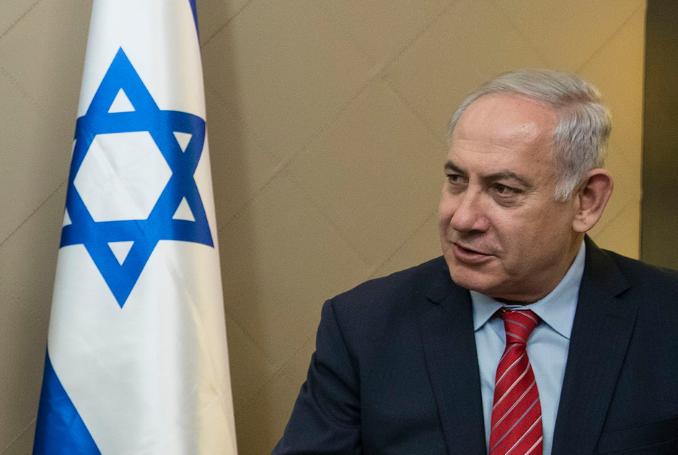‘Wishful Thinking’ – Does Israel Have All the Cards in Gaza?

Israeli Prime Minister Benjamin Netanyahu. (Photo: President of Ukraine, via Wikimedia Commons)
By Ramzy Baroud
Israeli Prime Minister Benjamin Netanyahu is often criticized for failing to produce a vision for the ‘next day’, meaning the day following the end of the Gaza war.
Some of these criticisms emanate from Israel’s traditional western allies, who are wary of Netanyahu’s personal and political agendas, which are fixated on delaying his corruption trials and ensuring that his extremist allies remain committed to the current government coalition.
The criticism however is loudest in Israel itself.
“As long as Hamas retains control over civilian life in Gaza, it may rebuild and strengthen (itself), thus requiring the IDF to return and fight in areas where it has already operated,” Defense Minister Yoav Gallant said last May, demanding a ‘day-after’ plan.
The same sentiment was conveyed by Israeli army chief Herzi Halevi. “As long as there’s no diplomatic process to develop a governing body in the Strip that isn’t Hamas, we’ll have to launch campaigns again and again,” he was quoted in Israel’s Channel 13 as saying.
It is true that Netanyahu has no post-war plan. The lack of such a ‘vision’, however, does not entirely rest on his own failure to produce one, but due to his inability to determine, with any degree of certainly, if the war would yield favorable results for Israel.
Nine months of war have shown that Israel is simply incapable of maintaining its military presence in urban areas, even those that have been ethnically cleansed or are sparsely populated.
This has been proven to be as true in the southern as in the northern parts of Gaza, including border towns that were relatively easy to enter in the first days or weeks of the war.
For a post-war plan that fits Israeli interests to be produced, Gaza would have to be militarily subdued, a goal that seems more distant than ever.
At the start of the war, and many times since then, Netanyahu argued that Israel would have “overall security responsibility” for the Gaza Strip “for an indefinite period”.
That too is unlikely, as Israel tried to establish such security control between 1967 and 2005 – when it was forced, due to the popular resistance during the Second Uprising to redeploy its forces out of the Gaza Strip, imposing a hermetic siege that has been in effect since then.
Recent events proved that even the Israeli blockade itself is unsustainable, as those who were entrusted with keeping Gazans locked in, failed miserably at their main task.
This assessment is that of the Israeli military itself. “On October 7, I failed (in) my life’s mission: to protect the (Gaza) envelope,” the commander of the 143rd Division, Brigadier General Avi Rosenfeld, said as he tendered his resignation on June 9.
This means that returning to the post-1967 war status is not a rational option, nor is the reactivation of the post-2005 so-called ‘disengagement plan.’
While Washington is busy hoping to devise an alternative that ensures long-term security for Israel – with no regard to Palestinian rights, freedom or security, of course – Netanyahu refuses to play along.
The problem with the American ideas, as far as the Israeli government is concerned, is that such language as ‘returning to negotiations’ and the like is completely taboo in Israel’s mainstream politics.
Additionally, Netanyahu rejects any involvement of the Palestinian Authority in Gaza. This position, which was even advocated by other Israeli officials, seems to puzzle many, as the PA is already incorporated into Israel’s security arrangements in the West Bank.
Netanyahu’s real fear is that a return of the PA to Gaza would come at a political price, as it would give greater credibility to PA President Mahmoud Abbas, who is keenly invested in the US-championed ‘peace process’.
Not only does the current Israeli leadership reject the return to the old political discourse, but it has also fundamentally moved on, passing that language into that of military annexation of the West Bank, and even the recolonization of Gaza.
To re-colonize Gaza, per the expectations of Israeli Minister of National Security, Itamar Ben-Gvir, two consecutive events would have to take place: First, the pacification of the Gaza Resistance, then, a partial or total ethnic cleansing of the Palestinian population there into Egypt.
While the Israeli army is failing at its first task, the second also seems unfeasible, especially since the recent Israeli operation in Rafah has pushed hundreds of thousands of displaced Gazans back, from the Gaza-Egypt border to the center of the Strip.
Netanyahu does not seem to have an actual plan for Gaza, neither for now nor after the war. So, he prolongs the war despite the fact that his army is exhausted, depleted and is being forced to fight on multiple fronts.
Blaming Netanyahu for failing to produce a ‘next day’ vision for Gaza, however, is also wishful thinking as it assumes that Israel has all the cards. It has none.
Of course, there is an alternative to the neverending war scenario, namely permanently lifting the siege on Gaza, ending the military occupation, and dismantling the apartheid regime. This would grant Palestinians their freedom and rights as enshrined, in fact, guaranteed in international and humanitarian laws.
If the international community mustered the courage to force such a ‘next day’ reality on Tel Aviv, there would be no need for war, or resistance in the first place.
– Dr. Ramzy Baroud is a journalist, author and the Editor of The Palestine Chronicle. He is the author of six books. His latest book, co-edited with Ilan Pappé, is ‘Our Vision for Liberation: Engaged Palestinian Leaders and Intellectuals Speak Out’. His other books include ‘My Father was a Freedom Fighter’ and ‘The Last Earth’. Baroud is a Non-resident Senior Research Fellow at the Center for Islam and Global Affairs (CIGA). His website is www.ramzybaroud.net










































0 Comments